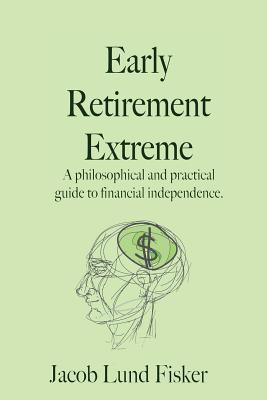What do you think?
Rate this book


238 pages, Paperback
First published September 30, 2010
I wish I read this when I was 21. Today, as an actual thirty-something retiree, I'm not sure how useful it is to me.
Jacob Lund Fisker is a guy who lives a kind of extreme lifestyle. He lives in a mobile home with his wife, spends less than $10,000 a year, foregoes appliances (like a washing machine) that many of us consider essential, and doesn't own a single thing he doesn't use at least twice a year. On the plus side, he retired at the age of 33. This wasn't an "I'll spend a year hiking the Pacific Crest and then get a job in a different field" retirement; he actually has all of the money he'll ever need to sustain himself in his current lifestyle. In this book, Fisker attempts to lay out the philosophical foundations for why someone would choose to follow in his footsteps, and offers a few practical steps to get started.
Unfortunately, it's the philosophical portion of the book that's the weakest. Chapters two through four are by far the book's nadir, as they fall prey to the armchair philosopher's greatest weakness; the tendency of the author to believe his own argument is infallible. He, in broad, hand-waving sweeps, dismisses the Middle Ages as an economic collapse (which it wasn't), paints a vision of a "Renaissance man" that would have probably thoroughly befuddled anyone from the Renaissance, and lavishes over sixty pages of dense, uncited text to explain to the user that consumerism is bad and you shouldn't fall prey to it. If you've so much as picked up this book, you probably don't need that message.
The sad part of this is that Fisker didn't need to do that. He has a compelling story about how he came to the point where he is, and if he merely *told* it, using his own background as illustration for the reader on how to avoid the perils of consumerism and debt, he'd have a much more gripping read.
And ultimately, this is the problem with the book as a whole: it doesn't know its audience. I picked it up, as a thirty-something retiree myself, partially to see the notes of someone who has already done something similar to me. The catch, which is now quite apparent, is that what he did is only passingly similar to what I have done; I retired by buying a home I could afford and saving over one million dollars. I can draw my assets at a hair over three percent without any significant privation from the consumer lifestyle that makes Fisker wary. Having done that, I'm not sure how or why I'd go about simplifying my life with the kinds of practices he describes in chapter six.
This book should be in the hands of college kids and twenty-somethings who have a shot of taking Fisker's message and running with it (much as Fisker did; he started his extreme retirement lifestyle in his mid-twenties). By painting it as a "retirement" book, he effectively forecloses this possibility.